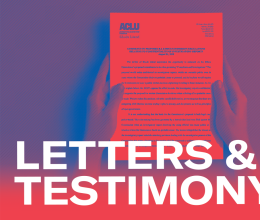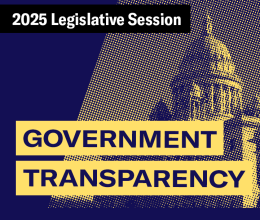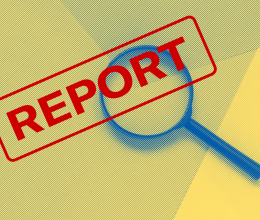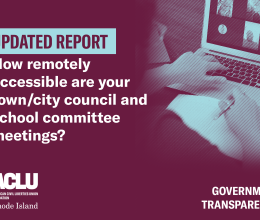By Philip Eil, journalist and RI ACLU plaintiff
I’ve had a busy few months since the RI ACLU helped me file a FOIA lawsuit against the Drug Enforcement Administration, in March. And I never got the chance to write a proper “Thank You” note. But when the House Committee on Oversight and Government Reform held its “Ensuring Transparency Through the Freedom of Information Act” hearings last week, in Washington, I got a jolting reminder of just how grateful I am. One testifying lawyer offered this bleak analysis: “It has become clear that only by filing litigation does a federal agency begin to produce documents in its possession responsive to the FOIA request.”
Before I dive into my “Thank You,” though, here’s a brief refresher on the lawsuit. Since 2009, I’ve been working on a book about one of my father’s med school classmates, Dr. Paul Volkman, who’s serving life in prison for a prescription drug-dealing scheme that led to the overdose deaths of at least four patients. And when Volkman’s trial ended, in 2011, I asked various court officials if I could see the evidence the jury saw. When they all said “No,” I filed a FOIA request.
The Department of Justice acknowledged receiving my request on February 28, 2012, and then proceeded to take more than three years – 1,108 days, to be exact – to fully process it. And, as the RI ACLU described in a press release, the delay is only half of the story:
In addition to the time it has taken to process the request, the DEA [a DOJ sub-agency] has withheld 87 percent of the 12,724 pages it has thus far processed for Eil’s FOIA request, and stripped most of the substantive information from the remaining 1,600 pages it has “released.” For example, as the lawsuit notes, one of the nine installments of releases to Eil included “a 133-page slide show where the substance from nearly every single slide is redacted.” In another one of the “partial releases” of information, the DEA withheld 1,225 of 1,232 pages it processed.
Now, I have a long list of reasons to thank the RI ACLU and pro-bono attorneys Neal McNamara and Jessica Jewell for helping me file this complaint (to which the DEA is legally required to respond by July 6). But I’d like to focus on three that I think I share with citizens across the United States.
1. By helping me sue the DEA, the RI ACLU is acting as a vital ally to journalists.
I’m thirty years old and I’ve already watched two beloved newspapers die. In fact, the San Francisco Bay Guardian (where I interned in 2008, launching my career in journalism) and the Providence Phoenix (where I worked as news editor and/or freelance contributor from 2008 to 2014) closed within days of each other, last year.
This is the media climate in which Volkman’s trial took place. In another era, a local newspaper might have sent a reporter to the courthouse to file a string of stories about the evidence, the expert testimony, and the fact that the case hinged mainly on the jury’s interpretation of the word “legitimate” – as in, “A prescription for a controlled substance to be effective must be issued for a legitimate medical purpose by an individual practitioner acting in the usual course of his professional practice,” from the Controlled Substances Act. It took eight weeks and more 70 witnesses for prosecutors to convince the jury that Volkman – a man with an M.D. and a Ph.D. in Toxicology from the University of Chicago – was a drug dealer. Along the way, the trial intersected with a number of complex medical and legal issues. In his recent book Dreamland: The True Tale of America’s Opiate Epidemic, former L.A. Times reporter Sam Quinones describes Portsmouth, Ohio (where most of Volkman’s alleged crimes took place) as “America’s pill mill capital.” This trial was a legal autopsy of one of the town’s most notorious clinics.
And, yet, during the few days I attended the trial (I was ejected via subpoena on Day 4, which is another story) I was the only reporter in the room. Wire services and other news organizations reported the start of trial; the New York Times wrote a few words on the verdict; and various outlets shared news of Volkman’s eye-popping four-consecutive-life-term sentence. That was it. You’ll find one of the most detailed accounts in a DEA-produced slideshow.
Unfortunately, we’re going to see more of this anemic, or non-existent, coverage of important trials for reasons Bill Moyers detailed in his recent speech, “The Challenge of Journalism is to Survive in the Pressure Cooker of Plutocracy.” In our current era – when newspapers shrink and die, en masse; when Pulitzer Prize winners take PR jobs; when the number of statehouse reporters across the country dwindles – journalists need allies. The RI ACLU answered my distress flare, and I’m hopeful that our lawsuit will break the lock on the Volkman trial, so I can (belatedly) deliver the coverage this case deserves.
2. By helping me sue the DEA, the RI ACLU is pushing back against a big-budget law enforcement agency with a reputation for bad behavior and non-transparency.
It’s always disturbing when taxpayer-funded agencies ignore and evade transparency laws. And it’s even more disturbing when these agencies have power to charge and detain people. By its own statistics, the Drug Enforcement Administration – which has a $2.88 billion projected budget for Fiscal Year 2015, and operates out of 221 domestic offices – made 29,612 domestic arrests last year. Unfortunately, the agency also has a transparency record that includes significant increases in FOIA rejections, exorbitant fee estimates, and egregious delays that spark the ire of federal judges.
Adding even more urgency to the need for oversight is the DEA’s stunning recent run of alleged malfeasance. Here’s a sampling of recent stories: “DEA Can’t Tell Senate How Detained Student Was Left to Drink Own Urine to Live,” “How the DEA Took a Young Man’s Life Savings Without Ever Charging Him With a Crime,” “DEA Agents Held Sex Parties With Women Hired by Cartels: Report,” “Justice Officials Launch Another Investigation of DEA Payments to Informants,” “Five Other Insane Things a Corrupt DEA Agent Did While Allegedly Stealing Bitcoin from Silk Road,” “DEA Eavesdropping Tripled, Bypassed Federal Courts.” These headlines come just from the eleven weeks since the RI ACLU and I filed our lawsuit.
What power does a lone citizen have to influence a law enforcement agency with a multibillion-dollar budget, a reputation for wrongdoing, and a longstanding disregard for transparency laws? Not much. But when the RI ACLU stands with me, I have a little more. And, aside from our lawsuit acting as a concrete step toward shining a light on the DEA’s work, it’s a chance to publicly push back against the Department of Justice’s mind-boggling assertion that it excels at responding to FOIA requests.
And I should add – as I always do – that this case was never about privileged materials or sealed documents. I only requested evidence that was produced by a taxpayer-funded investigation, presented during a taxpayer-funded trial, and used to send a U.S. citizen to a taxpayer-funded prison for the rest of his life. Until the release of that evidence occurs, Paul Volkman’s trial remains, effectively, a secret trial.
3. By helping me sue the DEA, the ACLU is defending the FOIA rights of American citizens.
In my recent letter to House Oversight, I described the events following my FOIA request as “the single most disillusioning experience of my life.” A big part of that was learning just how few effective options I had once my request went sour. Administrative appeals did not produce the documents I sought. Nor did letters to my U.S. senators and U.S. representatives. Nor did a letter to the President of the United States. Nor did a formal complaint to the “FOIA Ombudsman” at the National Archives’ Office of Government Information Services (OGIS). I have seen, first hand, how the court system is the real front line for FOIA. And until the system gets the reform it desperately needs, citizens will need lawyers to get the documents they’re legally entitled to.
The first page of my lawsuit may say “Philip Eil vs. U.S. Drug Enforcement Administration,” but I urge you, instead, to think of it in the terms that appear on Volkman’s indictment: “United States of America vs. Paul H. Volkman.” This lawsuit is not about saying “Volkman is innocent. Set him free”; it’s merely demanding, “I want to see what our government is doing, in our name, with our money.”
That’s what transparency and government accountability are all about. And I wholeheartedly thank the RI ACLU for supporting me in this fight.
Philip Eil is an award-winning freelance journalist based in Providence. He was the news editor at the Providence Phoenix until the paper's closing, in 2014, and, since then, he has contributed to Salon, Rhode Island Monthly, the Jewish Daily Forward, and elsewhere. In September, he will return to teaching in the Literary Arts + Studies Department at the Rhode Island School of Design.






